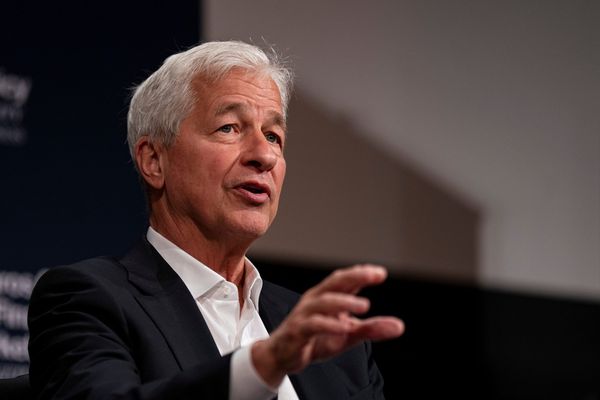Here are five things you must know for Wednesday, June 15:
1. -- Stock Futures Higher As Fed Rate Bets Accelerate
U.S. equity future moved higher Wednesday, following on from a session which consolidated a bear market for the S&P 500, as investors looked to perhaps the most important Federal Reserve rate decision in more than a decade late in the session.
Surging inflation, record-high gas prices, rising jobless claims data and a slowing domestic economy will all likely weigh on the Fed's rate decision, scheduled for 2:00 pm Eastern time, as traders brace for a potential shock to the central bank's communicated desire for a series of modest 50 basis point rate increases.
Rate traders are now locking-in the prospect of a 75 basis point move later today, which would take the FedFunds rate to a range of between 1.5% and 1.75%, as well as a follow-on move of the same size at the Fed's July meeting as inflation holds at the highest levels in forty years and looks set to accelerate further over the summer months.
The Fed's scheduled meeting, however, now comes just hours after an emergency gathering of policymakers at the European Central Bank, who convened Wednesday in Frankfurt amid wide-scale disruption in global and regional bond markets linked in part to the market's changing predictions of Fed rate hikes.
Benchmark 10-year German bund yields are now trading at the highest levels since 2014, at 1.77%, while the extra yield, or spread, that investors demand to hold lower-rated paper such as Italian government bonds has rise to around 2.4%, levels only last seen during the region's debt crisis.
Markets will also need to navigate a key reading of U.S. retail sales at 8:30 am Eastern time, which is expected to show a modest increase in the nominal amount of domestic spending -- thanks in part to sky-high consumer prices -- but may also reflect a growing reluctance to splurge amid record-low sentiment data and a slowing economy.
The cautious market backdrop, however, hasn't yet pushed stocks into the red, with Europe's region-wide Stoxx 600 marked 1.03% higher in early Frankfurt trading, following on from an essentially flat session for Asia's MSCI ex-Japan benchmark.
In the U.S., benchmark 10-year Treasury bond yields eased to 3.385%, against 2-year notes trading at 3.327%, while the the dollar index fell 0.64% from yesterday's 20-year high against a basket of six global currencies to 104.833 in early European trading.
On Wall Street, futures tied to the Dow Jones Industrial Average indicating a 177 point opening bell gain while those linked the S&P 500 are priced for a 25 point bump. Futures linked to the tech-focused Nasdaq are looking at a 90 point opening bell gain.
2. -- Fed Set For Bold Rate Move After Weeks of Softer Guidance
The Federal Reserve is likely to bring its most aggressive rate hikes in two decades later today in order to help tame the fastest inflation in four as Chairman Jerome Powell appears ready to abandon his own guidance in order to win back the central bank's waning credibility on Wall Street.
After weeks of reinforcing statements from Fed officials that a 75 basis point rate hike wasn't being "actively considered", last week's white-hot inflation reading, and the underlying pressures that drove it, tipped Wall Street into betting on just such a move from Powell and his colleagues.
The CME Group's FedWatch now indicates a 96.5% chance of a 75 basis point hike, which would take the FedFunds rate to a range of between 1.5% and 1.75%, which a small portion of traders even betting on the 'shock and awe' tactic of a 100 basis point move.
The market set-up, which includes sharply higher Treasury bond yields and fresh 20-year highs for the U.S. dollar, is now largely reliant on a bigger and bolder move from the Fed. But if inflation does slow later this year, will the demand for larger hikes now find buyer's remorse in a few months time?
The Fed does not have to play along with the markets’ hysteria. We appreciate that the Fed is now under great pressure to 'do something' to fix inflation. They have to hike," said Ian Shepherdson of Pantheon Macroeconomics. "But the inflation fix will not be more effective if the Fed hikes by 75 basis points today or next month, rather than 25 basis points, and the damage done to private sector wealth could inadvertently trigger a downturn which otherwise would be averted."
3. -- Tech Bosses Urge Congress to Pass Bill Boosting Chip Sector Support
CEOs from some of the biggest and most influential American companies signed a letter Wednesday urging Congress to help boost the competitiveness of domestic firms against their rivals in China.
The CEOs of Microsoft (MSFT), Amazon (AMZN) and Google parent Alphabet (GOOGL), as well as more than 100 other corporate bosses, put their name to the letter, which was arranged by the Semiconductor Industry Association lobby group and sent to both the House of Representatives and the Senate.
"The competitiveness legislation pending in Congress is critical to the U.S. economy, national security, and supply chain resilience," the letter said. "The rest of the world is not waiting for the U.S. to act. Our global competitors are investing in their industry, their workers, and their economies, and it is imperative that Congress act to enhance U.S. competitiveness."
The legislation, which could make it to voting stage before Congress' summer recess, would earmark $52 billion in federal funding to expand domestic chip manufacturing and reduce their dependence on overseas markets for crucial components in the nation's industrial and tech supply chain.
4. -- Biden Calls on Oil Companies to Boost Refining Capacity, Gas Supplies
President Joe Biden repeated his call for U.S. oil companies to expand refining capacity in order to help bring down record high gas prices, urging them to put investments over profits amid the country's energy crisis.
In a letter to the heads of Exxon Mobil (XOM), Chevron (CVX) and others, Biden demanded that oil companies do more to bring excess supplies of gasoline to the domestic market, accusing them of a lack of investment in the refining capacity needed to do so.
"At a time of war, refinery profit margins well above normal being passed directly onto American families are not acceptable," the President said. "The lack of refining capacity - and resulting unprecedented refinery profit margins - are blunting the impact of the historic actions my Administration has taken to address Vladimir Putin's Price Hike and are driving up costs for consumers."
The national average price for a gallon of gas held at $5.014 on Tuesday, according to AAA data, the highest nominal cost on record and a 63% from the same period last year, thanks to a combination of dwindling domestic supplies, surging summer demand and the impact of Russia's war on Ukraine on global crude markets.
WTI crude is up more than 60% so far this year, and trading firmly over the $120 per barrel mark, as sanctions on Russian oil exports, OPEC's reluctance to meaningly boost their collective monthly output and a shift in drilling investment from U.S. producers combine to lift global prices.
Exxon shares, which are up 52.25% so fare this year were marked 0.03% lower in pre-market trading at $96.07 each, while Chevron edged 0.27% to extend its year-to-date gain to 41.75%.
5. -- Bitcoin Nears $20,000 Level As Global Crypto Crash Intensifies
Bitcoin prices extended declines again Wednesday, pulling the world's biggest crypto currency close to the $20,000 level, as investors continue to dump non-yielding digital assets amid a surge in risk-free bond yields ahead of today's Fed rate decision.
Bitcoin prices were last seen 9.19% lower on the session at $20,222.20, a move that extends its year-to-date decline to around 52%. Broader crypto markets, which peaked at $2.9 trillion last year, have lost nearly $1 trillion in collective value over the past two months.
"Investors increasingly view Bitcoin as a technology investment, so it should be expected that the tech weighted Nasdaq correlates," said eCarbon CEO Joshua Fernando. "These individuals/institutions trade crypto like they trade tech stocks, resulting in a high correlation between the two, and a negating of the “inflation hedge” that crypto once was.”
Broader crypto markets, which peaked at $2.9 trillion last year, have lost nearly $1 trillion in collective value over the past two months.







